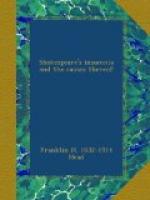known it might sadly mar my fortunes. In the vastness
of thy riches, the absence of these gems shall
not be noted. The loss of a star dims not
the splendor of the constellations. The glorious
sun seeks not to reclaim the lustre his rays have
given to the tiny dewdrop. Withal I have
rendered to thee somewhat of recompense as I have
spoken at sundry times to her gracious Majesty and
to our present anointed Sovereign of thy dramas,
and fostered as best I might thy interests when
they crossed not mine own. So I trust this boon
may be awarded me, and that my borrowed splendors may
not be stripped away. Thy immeasurable superiority,
as again evidenced in the sonnet to the Lady Mary,
has fixed anew my resolve as to my predestined
field of labor. Not for my brow shall be woven
the Poet’s garland of bays. Yet abundant
self-confidence is mine, and I augur that in the
great work for which I would fain believe the ages
are waiting, will be made clear my award to be
the high priest of Nature. Exact sciences
not yet born shall be my servitors and the augmenters
of my fame. By the methods I have discerned shall
mankind discover and apply those beneficent innovations
which are the chiefest births of time. Yet
even this hope hath its flavor of bitterness,
as thus guided my pupils may far overpass me and my
memory be lost. But the love of beauty and
melody in poesy is of perennial life, and thy
memory shall survive the mutations of time, and
shall be the Nation’s heritage while fancy and
imagination dwell in the souls of men.
Anew do I now discern that the meditation
of Nature and her laws, mysterious yet exact,
consorteth not with the airy fancies of the Poet’s
vision, and that our paths are diverse, yet each guiding
to what is useful and divine.
Farewell! and until the dolors
of death are mine shall I remember
thy sweet, loving kindness,
and admire thy shining genius where wit
and wisdom guide the flight
of a sovereign imagination.
Ever thy friend, Francis
Bacon.
One special point is notable in this letter from Bacon.
His ordinary correspondence is thickly sprinkled with
quotations in the ancient tongues. As he was
well acquainted with Shakespeare, this omission of
his customary Latin phrases would indicate that he
recognized Shakespeare’s lack of a thorough
classical education.
The next, and the last letter in the collection which
seems to have a bearing upon the sleeplessness of
Shakespeare, is also from Rev. Walter Blaise.
Stratford, April 3, 1609.
To William Shakespeare:




